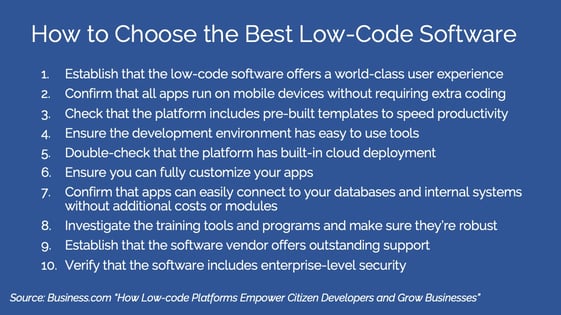Guide to Low Code Development Tools:
How to Choose the Right Low Code Tool for Your Organization
What Is Low Code Development?
Low-code app development allows for the fast creation of mobile and web applications by users with a wide range of coding skills. This new development process, which reduces the amount of native code required to program business applications, can be used by non-developers to create applications without coding. Experienced developers use low-code software to speed routine development beyond traditional coding.
How Developers Use Low Code Tools
Low code application development platforms are popular for creating custom business applications or mobile apps that work across multiple devices and operating systems. No-code app builders, which often utilize a drag-and-drop interface or simple programming language, don't require any coding at all. Though there has been concern about the scalability of these applications, rapid application development can help software developers build enterprise applications more quickly than native coding.
Finding the Best Low Code Platform
Businesses have a backlog of apps and must reduce hand-coding to achieve digital transformation. With over 150 no-code and low code vendors to consider – there are a lot of critical questions buyers must ask as they navigate the market and select a low code platform.

This guide to low-code software outlines some of the pros and cons of low code tools and offers practical guides for evaluating and successfully implementing this type of development.

Part I: Low-Code Development Handbook

Part 1: Adopting Low Code Development at Your Enterprise
Part 1 of the guide offers data recent data on low-code trends and low-code predictions. pragmatic examples of IT-led citizen development, and a list of requirements to ensure successful app development at your organization.
Part 2: 7 Necessary Features of Low Code Development Tools
Part 2 offers a list of the most critical enterprise capabilities that your development team should evaluate to ensure that both IT teams and business users can be successful with the platform. For example, can it tie into business process management systems?
Part 3: Determining the Best Low-Code Development Tools
There are key lessons to learn from other buyers' evaluation experiences. In Part 3 of the guide, read how one professional developer:
- Determined the top 8 low code development platforms to evaluate
- Set a methodology with 11 criteria to compare and test
- Evaluated what he learned
- Revealed which product came out on top for enterprise app development
Part 4: Achieving Returns on Low Code Development: Licensing Models and How They Affect TCO
Low-code development tools accelerate delivery and enable app production at a lower cost. If the development platform you select does not have the right combination of licensing, hosting, services and training, you could find scaling app development very painful and costly. Part 4 of the guide will help you negotiate the best price for your development platform.
How to Choose the Best Low Code Platform

Low code platforms are so useful, that the question no longer is whether you should use them. The question is: how do you pick the right app development product?
- Forrester estimates that the low code development platform market would grow more than 40% a year and reach $21.2 billion by 2022.
- Gartner forecasts that more than 65% of app development would be done via low code application platforms by 2024.
Selection Criteria for Low Code Tools
There’s a wide range of vendors in the market for low code development to choose from.
Given the availability of diverse platforms, it’d be best to carefully consider two key factors when selecting the right platform that fits all your requirements: what do you want it to do and can it teach business users how to become a citizen developer.
What do you want the platform to do?
There are low code mobile app development tools, which, as the name suggests, cater to mobile applications while others like web app tools are better suited for web applications. Still, other specialized solutions are designed for a specific functionality or industry. What specific function or task will your platform be used for?
There are also many universal platforms that serve various types of mobile and web apps throughout their complete lifecycle. Most startups and small to mid-sized businesses don’t need solutions with deep capabilities; they can opt for those with moderate capabilities which are quite affordable too.
Who will be using the low code platform?
Another crucial consideration is who will be using the solution. Will it be used by technical or non-technical users? For instance, if the intended users are professional developers, you can opt for low code app development tools that require programming knowledge and offer a high degree of customization to suit varying business needs.
On the other hand, when choosing a platform for non-technical users, it’d be best to check that the solution doesn’t require a high level of proficiency. Platforms that focus on visual development tools are best for non-technical users although they may offer less scope for tailoring.
Based on these factors, you can choose the ideal low code development tool or get one customized as per your specific business demands.
A Checklist for Selecting Low Code Software
- Establish that the low-code software offers a world-class user experience, such as a visual model
- Make sure when you build applications they run on mobile devices without requiring extra coding
- Check that the platform includes pre-built app templates you can use to speed time-to-market and productivity
- Ensure the development environment offers easy to use tools with a graphical user interface
- Double-check that the platform has built-in cloud deployment
- Ensure you can fully customize your apps for any business process, including process automation and real-time needs
- Confirm that the platform can easily connect to your databases, data models and internal systems
- Investigate the training tools and programs and make sure they’re robust
- Establish that outstanding support is available
- Verify that the software includes enterprise security, including access control
Source: Business.com, “How Low-Code Platforms Empower Citizen Developers and Grow Businesses,”

Criteria for Evaluating Low Code Software: A Deeper Dive
The Business.com article, “How Low Code Platforms Empower Citizen Developers and Grow Businesses,” offers some excellent advice for selecting the right low-code app development platform.
 The article says to choose a product that offers a world-class user experience. The article notes: “Ensure that apps developed using your platform of choice look great and perform well. Otherwise, your developers will only end up building shelf-ware.”
The article says to choose a product that offers a world-class user experience. The article notes: “Ensure that apps developed using your platform of choice look great and perform well. Otherwise, your developers will only end up building shelf-ware.”
Next, make sure the platform can build apps that run on mobile devices without having to do additional coding.
Especially important, the article says, is that the platform lets you use app templates for internal or customer-facing apps.
The platform should include intuitive, visual, easy-to-use tools. That means it should have drag-and-drop tools, wizards, and similar features.

The platform should allow developers to fully customize business apps.
The article goes on to say, that it’s particularly vital that the platform can easily connect to databases and a company’s internal systems.
Often overlooked is the importance of the complete development lifecycle, including solid training and customer support.
The article also recommends, “Pay attention to the SLA and read online reviews. Happy customers often mention the quality of support they receive and it’s something you should look out for in reviews and referrals.”
Finally, pay attention to the basics, including enterprise security and scalability.
Alpha Anywhere can rapidly create custom applications that feature GPS, photos, video, bar code scanning, and more. The apps can access and integrate with any database or web service, include role-based security, and work with or without an Internet connection. The software is ideal for companies building custom applications. You can download a free low-code software license, allowing you to create apps as you need them at no charge and with no time limitations.
Have questions? Contact Alpha Software at 781-850-4600
